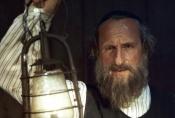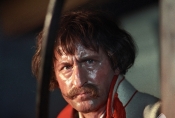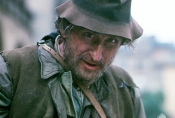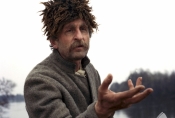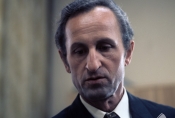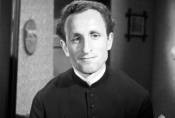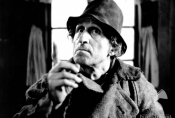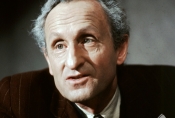Franciszek Pieczka
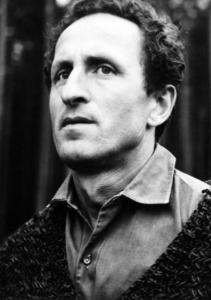
“When they start organising various events in your honour that means that people already see that you’re finished as an artist. And I think that octogenarians have a broader perspective. I no longer have to do anything, but I still can do everything,” he said in an interview on his eighty-fifth birthday.
He was born on January 18, 1928 in Godów near Wodzisław. He is a graduate of the Acting Department of the State Higher School of Theatre in Warsaw (1954). After graduation, he joined the Dolnośląski Theatre in Jelenia Gora (1954-1955), and then the Ludowy Theatre in Nowa Huta (1955-1964). Since 1965, he has worked for the Powszechny Theatre in Warsaw. Winner of many prestigious awards, including Golden Screen” (1984), “Grand Splendour” (1996) and “Superwiktor” (2009).
He made his debut in a cameo role of a German soldier in Pokolenie/Generation (1954) by Andrzej Wajda. Many years later, he gave two more interesting performances in films by this director, namely Czepiec in Wesele/The Wedding (1972) and Muller in Ziemia obiecana/The Promised Land (1974). The first big role was in Żywot Mateusza/The Life of Matthew (1967) by Witold Leszczynski, a beautiful poetic film version of the novel by Terjei Vesaas Birds. The title character lives with his sister somewhere in a remote area on the banks of a lake. When a woodsman named Jan takes away his sister, a hunter kills the “big bird,” and a lightning destroys his favourite tree, Matthew cannot see the point of further existence ... For this performance Pieczka won the Silver Hugo at the Chicago Film Festival (1968). Before Leszczynski’s film, he had played “Kosa,” labourer with a shady past working at the construction of a large dam, in Chudy i inni/Skinny and Others (1966), the debut film of Henryk Kluba, a psychological study disguised as a communist “production film.” He gave a truly memorable performance Kluba’s subsequent film Słońce wschodzi raz na dzień/The Sun Rises Once A Day (1967, premiered in 1972), set in the first years after the war in one of the Beskidy villages. The film tells the story of Haratyk, a folk hero, who, captured by the communist authorities, was sentenced to years in prison; he was not released until 1956.
He played similar “folk” heroes in films by Jan Jakub Kolski: Mateusz Szewczyk in Pogrzeb kartofla/The Funeral Of A Potato (1990), Kaczub in Pograbek (1992), the eponymous Jańcio Wodnik/Johnnie the Waterman (1993), the hermit in Cudowne miejsce/Miraculous Place (1994), Kotek in Szabla od komendanta/ Sabre from the Commander (1995), Marczyk in Grający z talerza/Playing from the Plate (2005), uncle Janek in Historia kina w Popielawach/The History of Cinema in Popielawy (1998), and Saint Roch in Jasminum (2006). “The father of Jan Jakub [Kolski], a film editor, worked on the set of the TV series Czterej pancerni i pies/Four Tankmen and a Dog and would often take his son with him to work to the Łódź Film Studio. Janek was fascinated by what his father is doing and the things that were happening on screen, so when I asked him who he wanted to be, he would solemnly reply that he wanted to be a film director. He also said that as soon that happens, he would offer me a role in his film. Twenty years passed and he actually kept his word. I was cast in several of his films. Meeting with Janek Kolski was a big surprise for me. Such a young man, at the very beginning of his career, and he already has all the qualities of a true film director. He has a specific vision for the film, but he also listens very carefully to the suggestions of actors,” the actor confessed in “Rzeczpospolita” (2001). Pieczka’s performance in Witold Leszczyński’s Konopielka (1981), predating Kolski’s films, in which he played the “double” role of a beggar and ... God, is vaguely reminiscent of the characters he would later embody.
Pieczka hails from Silesia, no wonder then that he has often been cast it films set in that region. He had interesting roles in Perła w koronie/Pearl in the Crown (1971) and Paciorkach jednego różańca/The Beads of One Rosary (1979) by Kazimierz Kutz, as well as Okrągły tydzień [Round week] (1977) by Tadeusz Kijański. Another significant role was his performance in Krzysztof Kieslowski's feature debut – Blizna/Scar (1976), a paradocumentary story of the director of a huge conglomerate built as a result of political decisions, contrary to common sense, in an absolutely unsuitable location. The wrong decision of the authorities provokes acute social protests. The embittered director leaves the factory and goes back to Silesia, to his family.
Pieczka has appeared in over 120 films and television seriesHe played a number of significant, though not always main roles, such as Odryn in Matka Joanna od Aniołów/Mother Joan of the Angels (1960), the innkeeper Tag in Austeria (1982) by Jerzy Kawalerowicz, the “King of Life” in Szklana kula [The glass sphere] (1972) by Stanisław Różewicz, old Kiemlicz in Potop/The Deluge (1974) by Jerzy Hoffman, Jóżef Ślimak in Placówka/The Outpost (1979) by Zygmunt Skonieczny, or Cyga in Matka Królów/Mother of Kings (1982) by Janusz Zaorski. However, he is best known for his roles in TV series, especially as the tanker Gustlik in Czterej pancerni i pies/Four Tankmen and a Dog (1966-1970) by Konrad Nałęcki.
Selected filmography
-
1960
MOTHER JOAN OF THE ANGELS
reż. Jerzy Kawalerowicz
-
1964
THE MANUSCRIPT FOUND IN SARAGOSSA
reż. Wojciech Jerzy Has
-
1967
MATTHEW’S DAYS
reż. Witold Leszczyński
-
1967
THE SUN RISES ONCE A DAY
reż. Henryk Kluba
-
1971
THE PEARL IN THE CROWN
reż. Kazimierz Kutz
-
1972
THE WEDDING
reż. Andrzej Wajda
-
1974
THE DELUGE
reż. Jerzy Hoffman
-
1974
THE PROMISED LAND
reż. Andrzej Wajda
-
1979
BEADS OF ONE ROSARY
reż. Kazimierz Kutz
-
1982
THE INN
reż. Jerzy Kawalerowicz
-
1982
THE MOTHER OF KINGS
reż. Janusz Zaorski
-
1983
FAITHFUL RIVER
reż. Tadeusz Chmielewski
-
1985
AXILIAD
reż. Witold Leszczyński
-
1993
JOHNNIE THE WATERMAN
reż. Jan Jakub Kolski
